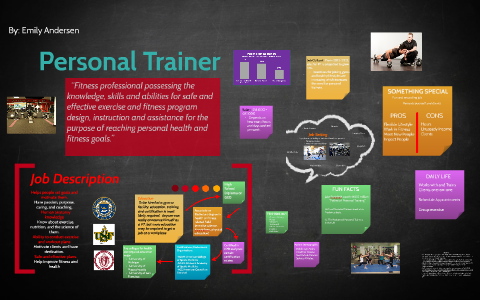
There are many factors to consider when you want to begin a career as a part-time personal trainer. These factors include your education and pay scale. Consider the possibility for career growth. Here are some top considerations. If you are passionate about fitness and health, this is the career path for you.
Job description
This job description will outline the duties and responsibilities of a part time personal trainer. These tasks include creating customized fitness plans for clients and cleaning equipment to ensure safety in a gym. Personal trainers can also offer advice about nutrition and lifestyle. A certification in the field is required to qualify for a part-time job as a personal coach. Certified personal trainers must also be proficient in CPR and first aid.
Part-time personal coaches should be flexible and willing to work multiple hours. They might be available on weekends and holidays, as well as at night. They might also have to spend long hours building a client base or recruiting new clients. They might also be required to work at local gyms, parks, and on cruise ships.

Education necessary
There are several types of certifications that can be obtained to work in the field of personal training. You may consider a degree or certificate in physical therapy and exercise science to pursue a career in the field. A graduate degree will give more freedom and allow you to specialize. These areas include nutrition, strength training, cardio conditioning, heart health, exercise theory and functional movement. To have a greater management role, you may also be eligible for a master's level in personal trainer training.
A rewarding career as a personal trainer is available to anyone who wants a flexible work schedule and the opportunity to help others. This is a high-paying career option that allows you to help others achieve their fitness goals. While you may be working part time, you can still enjoy all the benefits of a full-time job.
Pay scale
The salary of a personal coach will depend on how experienced he/she is, how many clients he/she has, and how much time devoted to the job. This career can earn between $30k to $200k annually. You may not have enough time to make the most your personal training career. A trained trainer can charge between $30 and $50 an-hour, while charging upwards of $75 an hour.
This profession is highly rewarding. You will be a motivator and inspirer for others as a personal trainer. Whether you are a working professional or a stay-at-home parent, personal training offers many rewards and a flexible schedule.

Career growth potential
A part-time career as a personal trainer is an option for people who want to make a career shift. This career is flexible and offers the opportunity to grow rapidly. This is the ideal career choice for parents with busy schedules and stay-at home moms who want to make more money. Although this career path does come with its challenges, it offers many rewards as well.
Places to work
Personal training is a promising career option for those who are interested in pursuing a degree related to health or need a parttime job. As a personal trainer, you can inspire and motivate others to achieve their fitness goals. This is an exciting career with great job satisfaction. You can also work part-time as a personal trainer and still get the full benefits of a permanent position.
FAQ
What are Resistance Training Exercises?
Resistance training can be done with weights or other objects. Lifting weights will strengthen your arms. Resistance training improves muscle mass, bone density and overall strength.
Can I exercise after eating?
It depends on the type and intensity of your exercise. Avoid strenuous activities after meals because they can cause stomach cramps. Light aerobic activities, such as walking or biking, are better.
Do I need warmth before I exercise?
Warming up prior to an activity helps reduce muscle soreness. It also improves performance. There are many methods you can use to warm up, including running, jumping rope and stretching. You can start slowly and increase your intensity gradually.
Statistics
- Physical activity confers the following maternal and fetal health benefits: a decreased risk of pre-eclampsia, gestational hypertension, gestational diabetes (for example, 30% reduction in risk) (who.int)
- An estimated 110,000 deaths per year could be prevented (cdc.gov)
- Globally, 81% of adolescents aged 11-17 years were insufficiently physically active in 2016. (who.int)
- Adolescent girls were less active than adolescent boys, with 85% vs. 78% not meeting WHO recommendations of at least 60 minutes of moderate to vigorous intensity physical activity per day. (who.int)
External Links
How To
How To Stay Fit At 40
This article provides guidance for people who want to keep their bodies strong and healthy, even after turning 40. It covers some basic advice on how to eat right, exercise, sleep well and take care of your mental health. This article will give you tips on living longer and healthier.
-
Eat Right - The first thing you should do when trying to stay fit is to ensure you're eating the right foods. You should try to avoid processed food products and opt for whole grains, fruits, vegetables, lean meats, fish, nuts, seeds, and beans. Do not eat what you don’t like. You can add another food to your daily diet. You don't have to eat a lot. This won't help you lose any weight. Instead, try adding small amounts to your daily meals. For example, if you normally only eat chicken breast, try turkey once weekly. Or if you love pasta, try rice occasionally. Try to incorporate these types of foods into your diet so that they become part of your everyday life.
-
Exercise - Make sure to exercise at least three times per week. Ensure you include cardio activities such as walking, running, swimming, biking, dancing, etc. Also, make sure you get enough rest. It is recommended to get 8 hours of sleep each night. It is important to drink enough water throughout each day. Try to drink 2 liters (0.5 gallons) of water every day.
-
Sleep Well - Proper sleep is crucial for staying healthy. According to the National Sleep Foundation, adults require 7-8 hours of sleep daily to maintain optimal physical and emotional health. Most people get less than 6 hours sleep each night. Try making changes to your sleeping schedule if you feel constantly tired. You can catch more sleep by changing your sleeping schedule so that you go to bed earlier or wake up later. Additionally, try turning off your phone before going to bed so that you can wind down and relax. Avoid caffeine after noon as it can cause insomnia.
-
Take care of your mental well-being - It's important to take good care your mind and keep your body in tip top shape. Stress can lead to unhealthy eating habits, poor lifestyle choices, and poor sleep habits. Stress management techniques such meditation, yoga and breathing exercises are important. Do something that is enjoyable for at least an hour. This could include taking a walk outdoors, reading a novel, listening or watching TV, and playing sports.
The above four points will ensure that you live longer and healthier. These four simple steps will help achieve your fitness goals.